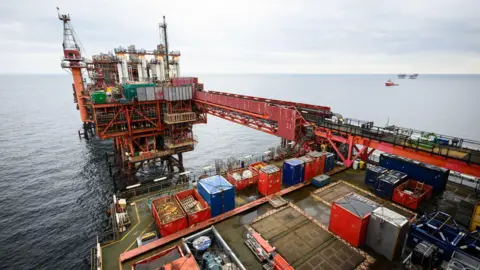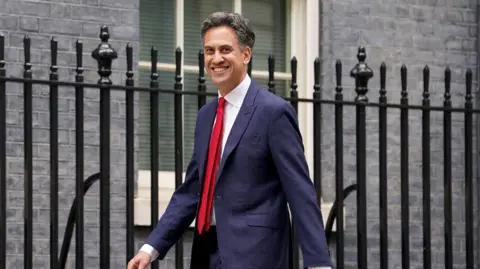Government admits new Rosebank oil field approved unlawfully

 PA Media
PA MediaThe UK government has admitted in court that the country’s largest untapped oilfield, Rosebank off Shetland, was approved unlawfully.
The move came during a case brought by climate campaigners against both Rosebank and the Jackdaw gas field in the North Sea.
At the Court of Session in Edinburgh Chris Pirie KC, for the government, accepted that assessments did not include “the effects on climate of the combustion of oil and gas to be extracted from the fields.”
Rosebank was given the green light on 27 September 2023 and Jackdaw on 1 June 2022, both by the previous Conservative administration.
As part of the consenting process, the government was required to consider environmental impact assessments about the fields.
These take into account the impact on climate change of emissions caused by the process of extracting oil and gas but not of greenhouse gases which would be released when the fossil fuels were eventually burned.
 PA Media
PA MediaIn June the UK Supreme Court ruled in a separate case, involving plans to drill an oil well near London’s Gatwick Airport, that both types of emissions should be included in an environmental impact assessment.
In the judicial review at the Court of Session, environmental groups Greenpeace and Uplift are arguing that this means work on Rosebank and Jackdaw should be paused while fuller environmental impact assessments are carried out.
If the judge, Lord Ericht, agrees, Sir Keir Starmer’s Labour government may end up with the final say on whether or not drilling should go ahead.
Mr Pirie said if that did happen, the current thinking of the energy secretary Ed Milliband was not to require the assessment process to begin afresh but to request the additional information relating to the climate impact of burning the fuels, before issuing a new decision.
 PA Media
PA MediaThe firms involved — Shell, Equinor, and Ithaca Energy — say they should be allowed to carry on with drilling because permission was granted in good faith under the law as it was understood at the time.
For Shell, Christine O’Neill KC told the court that any temporary pause and resumption of works would not be straightforward and would amount to the Jackdaw project being “brought to a permanent end.”
Lord Ericht took issue with that assertion but the lawyer insisted that in such a case the court could have “no assurance” that Jackdaw could proceed.
Shell, she said, had “acted lawfully” in relying on the government’s consent and should not “be punished” for doing so.
Ms O’Neill also took issue with the environmental groups’ claim that it was “an accepted fact” that Jackdaw would have “a substantial impact” on the climate and human health.
She said Shell accepted the existence of climate change; accepted that greenhouse gas emissions contributed to climate change; and accepted that urgent action was needed to tackle it.
Ms O’Neill conceded that Shell also accepted the approval of Jackdaw had involved an “error in law”.
However, she added “the question whether, how and to what extent any individual project contributes to climate change is a complex one”.
The hearing is expected to continue tomorrow but Lord Ericht is not expected to issue his judgment for some weeks or months.





